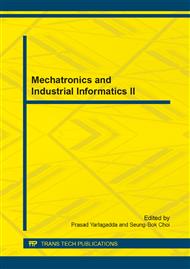p.1030
p.1034
p.1040
p.1044
p.1048
p.1052
p.1056
p.1060
p.1065
SWOT Analysis of Chinese Rural Information Society Policies
Abstract:
This paper presents an analysis of strengths, weaknesses, opportunities, and threats (SWOT) for Chinese rural information society development (CRISD) policies in terms of its missions and strategies. After briefly describing the institutional and information society development contexts, the paper draws on literature reviews and questionnaires survey to list of SWOT factors for CRISD. These findings could be used to help adjust the next step work to support decision making for rural information society construction and to provide a valuable reference for other investors who are planning to invest in information society programs in China’s rural regions. This article presents valuable missions and strategic goals through the SWOT analysis for realizing information society development in Chinese rural areas.
Info:
Periodical:
Pages:
1065-1068
DOI:
Citation:
Online since:
July 2014
Authors:
Keywords:
Price:
Сopyright:
© 2014 Trans Tech Publications Ltd. All Rights Reserved
Share:
Citation:


